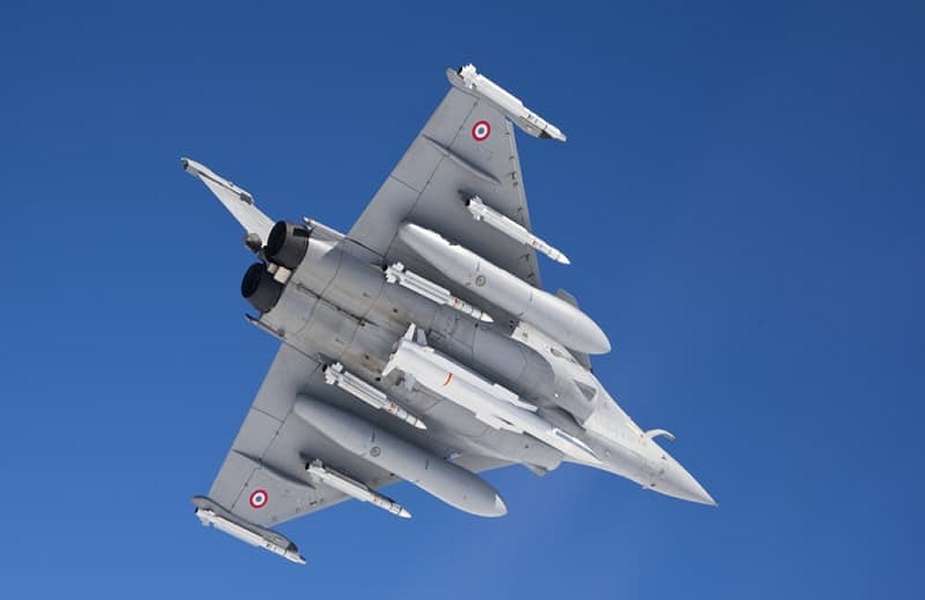Breaking news
French President Advocates for Nuclear Inclusion in European Defense Strategy.
On April 28, 2024, French President Emmanuel Macron reignited discussions on European defense, focusing this time on the inclusion of nuclear weapons in continental defense strategies. During a session in Strasbourg with young Europeans facilitated by Ebra group newspapers, Macron emphasized the need to debate issues including missile defense, long-range missiles, and both French and American nuclear weapons stationed in Europe.
Follow Army Recognition on Google News at this link

In 2022, France has conducted a qualification firing of a medium-range air-to-ground missile that will equip the Rafale jets until 2035 (Picture source: MBDA)
Macron clarified that French doctrine allows nuclear weapons to be used when the nation's vital interests are threatened, and he extended these interests to include a European dimension, though details were scant. This stance was supported by Foreign Minister Stéphane Séjourné, who in an interview with Germany's Welt newspaper, advocated for Europe to develop "sovereignty and strategic autonomy" in addition to NATO support.
Macron's call for an autonomous European defense is not new. In February 2020, he advocated for a credible, autonomous European defense during a speech at France's War College, suggesting a European nuclear deterrent. This proposal aimed to initiate strategic dialogue with European partners willing to discuss the role of France's nuclear deterrent in collective European security.
This push comes in a significantly altered environment, notably marked by Russia's invasion of Ukraine, which has shifted threat perceptions and led countries like Finland and Sweden to join NATO. Despite NATO's continued role as a protective measure, Macron argues that Europe needs to establish its own credible defense, especially as U.S. geopolitical priorities may shift away from the continent.
The French military nuclear capabilities are centered around a well-equipped and modern strategic nuclear force known as the "Force de frappe." This includes the naval component, which operates four Triomphant-class ballistic missile submarines. Each of these submarines is armed with M51 ballistic missiles, which have a range capable of reaching targets far beyond European borders. These missiles are equipped with multiple independently targetable reentry vehicles (MIRVs), enhancing their effectiveness and deterrence capability.
In the aerial domain, the French Air Force employs the Rafale fighter jets, which are capable of delivering the ASMP-A nuclear missiles. These medium-range air-to-surface missiles are designed to penetrate high-value targets at extended distances, ensuring a credible deterrence force. The ASMP-A missile system is an integral part of maintaining France's autonomous nuclear strike capability, allowing for a flexible and rapid response to threats.
Nuclear weapons play a central role in European defense strategy. Only a few European nations, such as France and the United Kingdom, possess their own nuclear arsenals, maintained and controlled as part of their national defense policies. Additionally, other European countries under NATO, including Germany, Belgium, Italy, the Netherlands, and Turkey, host U.S. nuclear weapons as part of a nuclear sharing arrangement. The use of these weapons would require a joint agreement between the U.S. and the host country, envisioned only under extreme circumstances where national or NATO vital security interests are at risk.
However, the concept of a unified European nuclear policy presents significant structural challenges. One major issue is determining who would have the authority to launch nuclear weapons within the European Union. Given the diversity of defense policies and strategic perspectives among member states, forming a consensus or decision-making mechanism that reflects the interests of all members while ensuring timely responses to imminent threats is complex. This complexity is further compounded by legal and political differences between nuclear and non-nuclear states, highlighting the hurdles to integrating a cohesive European nuclear defense policy.
Defense News April 2024


























